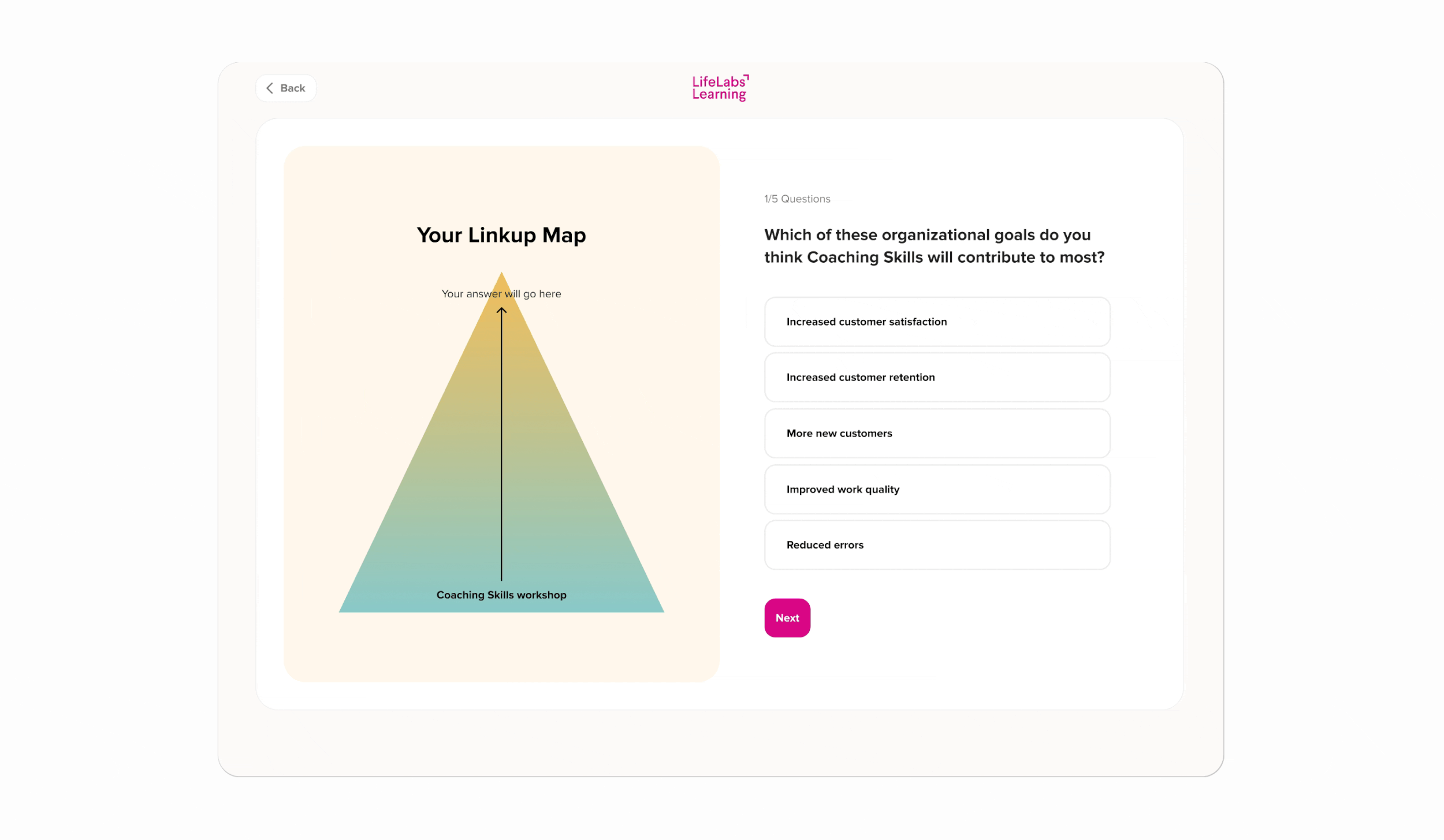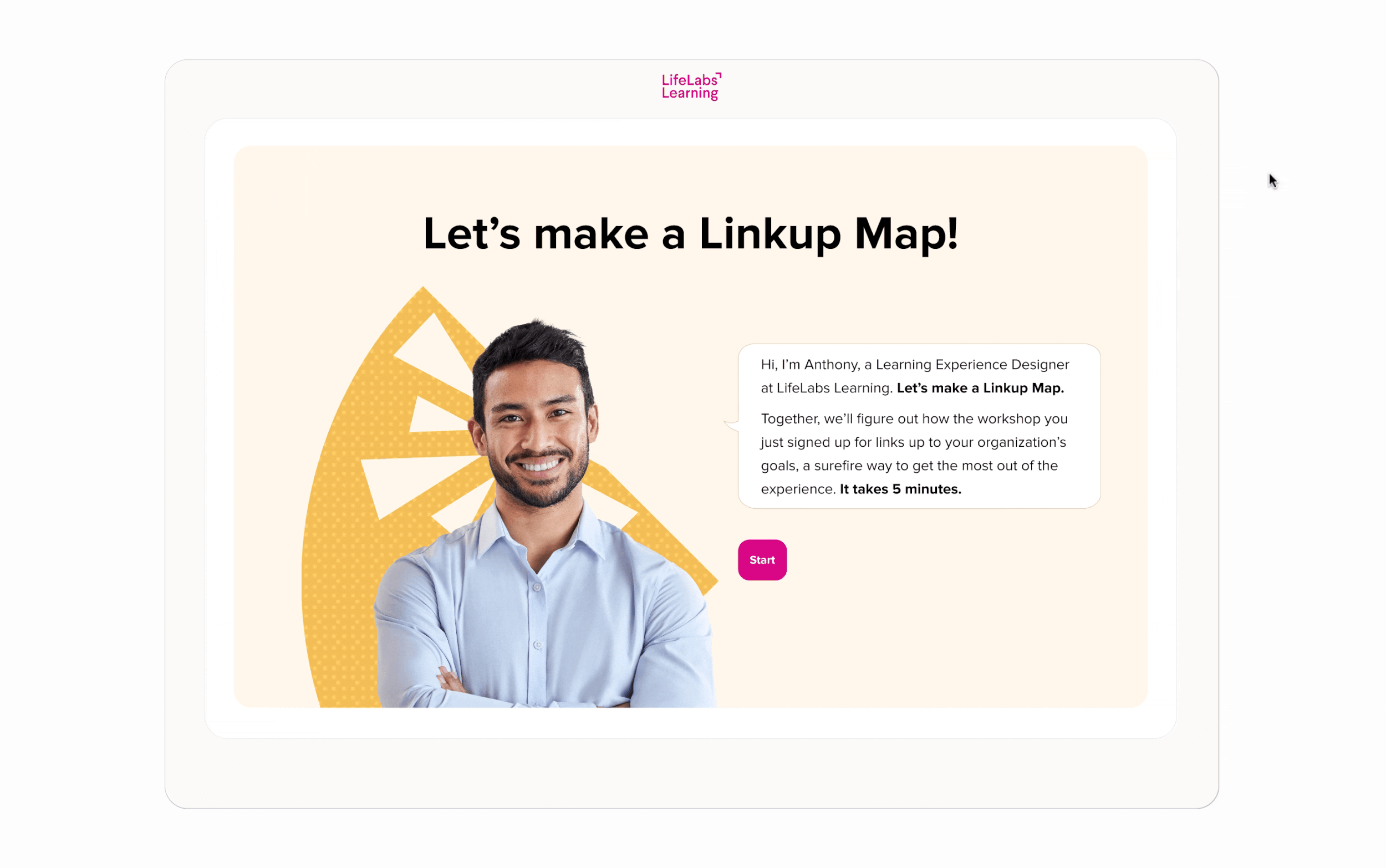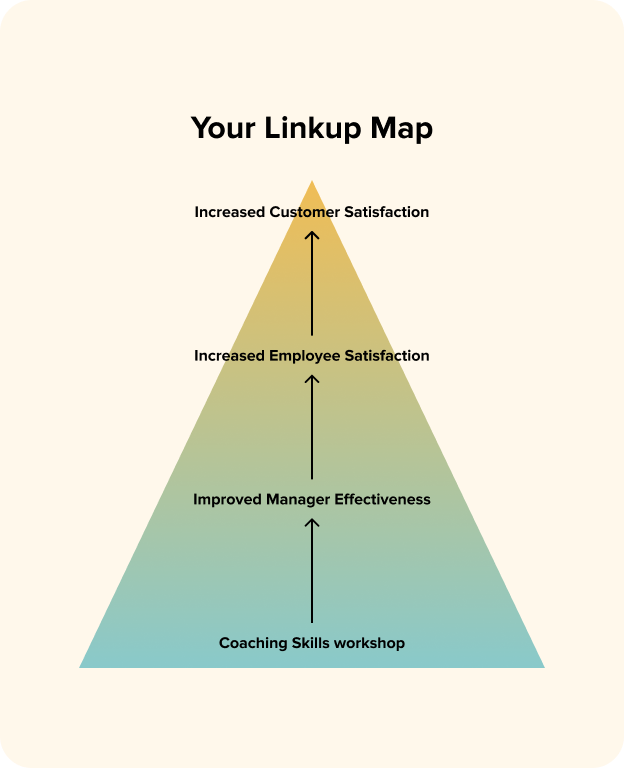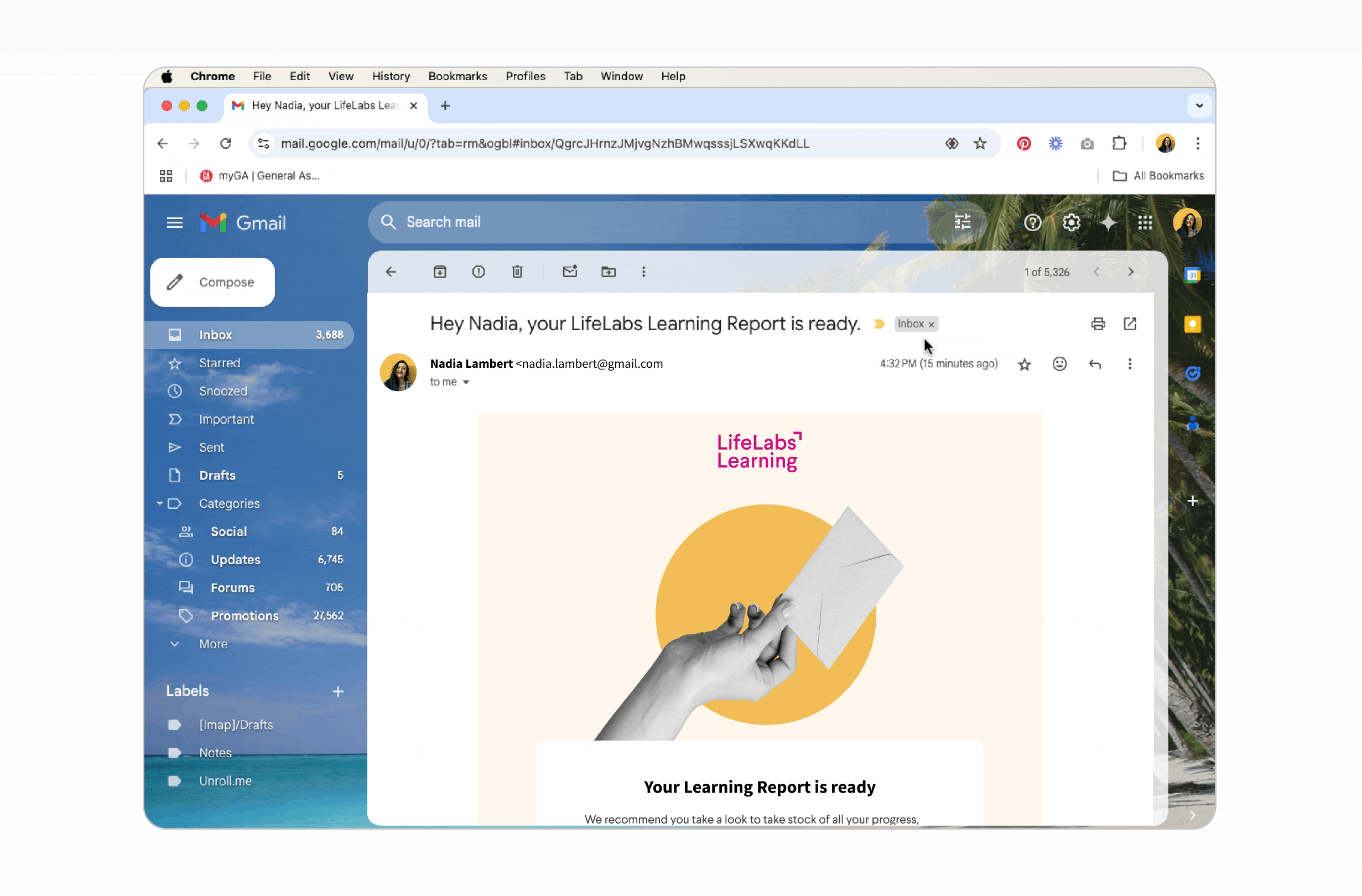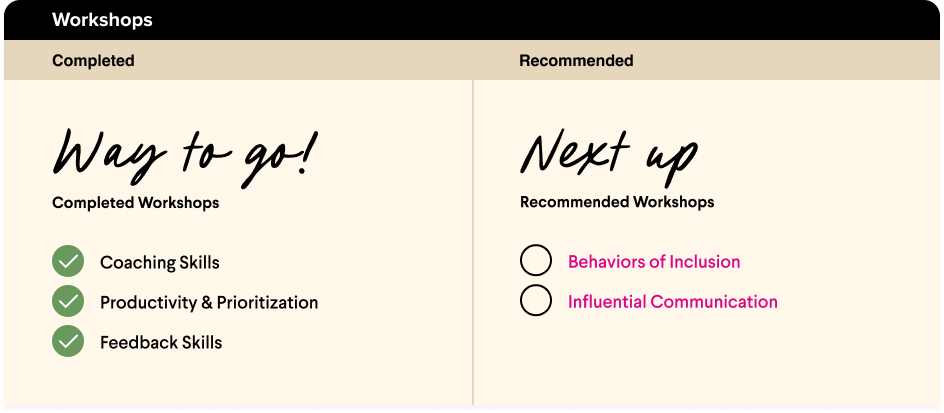Creating personalized learning experiences to scale membership
Three prototypes to drive engagement and renewals
OVERVIEWMy role
Product design
Team
Product Manager
3 Learning Experience Designers
Company
LifeLabs Learning
THE BRIEFHelp LifeLabs Learning scale digital memberships by creating high-context, personalized learning experiences.
Overview
LifeLabs Learning is a B2B professional soft skills training company that offers 2-hour live workshops both in-person and virtually. The company became successful selling private programs. In order to scale, they added a self-service digital membership.
Why did this project exist in the first place?
To counteract the steep drop-off rates typical of digital learning platforms—and to keep up with the competitors in the space—the product team decided to experiment with prototyping high-context, personalized learning experiences to maximize engagement and encourage renewals.
What did users say?
We didn’t specifically interview learners or conduct usability tests on them for this project. Instead, we referred to a Jobs-to-be-Done framework created base on past user interviews (6 learners, 13 sponsors, and 10 internal team members) and focused on the job statements related to personalized experiences for learners.
I worked with the 3 Learning Experience Designers to prototype 3 experiences: Linkup Map Maker, Prime Performance Coach, and Skill Set Progress Tracker
WHY PERSONALIZED LEARNING?72% of customers expect personalization
According to a 2021 McKinsey Report, 72% of people expect the businesses they buy from to recognize them as individuals and know their interests
Only 23% of employees are engaged at work
According to a Gallup Poll of over 120,000+ people, only 23% were engaged at work in 2022. Disengagement can lead to high turnover and lost productivity.
Adults learn best when the application is clear
According to Knowles' andragogy learning theory, there are six pillars of how adults learn. All are related to meeting the the learner where they are with material that is relevant to them.
OUTCOMESWe validated the need for personalization and won more budget to implement it
Our research confirmed that personalization would boost registration and engagement. As a result, LifeLabs invested in new functionality on our whitelabeled platform to implement learner pathing features.
I educated the team about product design, increased trust, and improved our collaboration
The Learning Experience Designers were unclear about what product design was. After this project, they realized I could not only help them create visuals, but also think through experiences and make them stronger. Our trust group and creativity grew.
User problems
Learners wanted workshops that were relevant to their experience level and current challenges.
We interviewed 6 learners, 13 sponsors, and 10 internal team members about the learning experience.
Guilt about time away from work. “Two hours is a lot of time to carve out during the middle of the work day for a workshop.”
Irrelevant or redundant content. “The workshops cover topics in such an elementary way. It feels like they are intended for people new to the workforce, not managers.”
Lack of social context. “Sometimes it’s difficult to stay motivated. I’d like to be able to see what others recommend and share my progress with them.”
Project goals
Prototype experiences that direct learners to relevant, timely workshops.
We used the common themes from our research as the basis for Jobs-to-be-Done statements. I worked with each of the three Learning Experience Designers to prototype a solution for each one.
A concrete link to goals. When I feel guilty about taking time to focus on development, help me understand how it can improve performance and growth.
Relevant, timely help. When I struggle to find for relevant workshops, help me identify the ones that best align with what I need right now.
A learning community. When I want to to grow as a leader, help me connect me with other growing leaders so we can motivate each other and share learnings.
Solution 1: Linkup Map Maker
Helping learners make the link between workshops and organizational goals
Learner filling out a Linkup Map Maker survey.
The problem
Guilt about time away from work. “Two hours is a lot of time to carve out during the middle of the work day for a workshop.”
The goal
Clarify the benefit. When I feel guilty about taking time for a workshop, help me see how it can concretely increase personal and organizational growth.
The solution
Start with why. One of LifeLabs’ “Behavioral Units” is called the LinkUp. It connects of an action to its goal. When someone understands why they’re doing something, they make better decisions about it, and they are more motivated to take action. We applied the Linkup to the task of taking a workshop. Our in-app survey helps learners connect an upcoming workshop to a company goal.
“I had an aha moment working with Natalya and realized that our digital learning experience should put our core intellectual property into action, improving our key metrics and showing the efficacy of our approach at the same time. There are many potential extensions of this idea.”
Rachel, Learning Experience Designer
Solution 2: Prime Performance Coach
Directing learners to timely content to help them transform their careers.
The learner receives an email notification to review their Learning Report and share it with their manager.
The problem
Irrelevant or redundant content. “The workshops cover topics in such an elementary way. It feels like they are intended for people new to the workforce.”
The goal
Relevant, timely content. When learners struggle to find for the right workshop for them, help them the ones that best align with their experience and current needs.
The solution
Just-in-time learning. We designed an onboarding survey to glean where a learner’s role level (independent contributor, manager, or director) and what professional milestones were coming up for them at work (big presentations, performance reviews, etc). Based on that information, we created notifications recommending learning actions at strategic times. For example: “Your review is two weeks away. This would be a good time to take a feedback workshop.”
Proof of progress. In addition, we designed a weekly one-question survey prompting the learner to record occasions when they put a LifeLabs Behavioral Unit into action. At the end of the quarter, we notified them that their Learning Report was available for them to review and to share with their manager if they wished.
“As a learning experience designer, I was used to doing everything myself. This project taught me that it’s important to bring in the product designer immediately because the two disciplines influence each other a lot.”
Nyasha, Learning Experience Designer
Solution 3: Skill Set Progress Tracker
Motivating learners to build new skills with badges and social sharing.
A learner checks their Skill Set progress on their dashboard, and checks their organization’s page.
The problem
Lack of social context. “Sometimes it’s difficult to stay motivated. I’d like to be able to see what others recommend and share my progress with them.”
The goal
A learning community. When I want to to grow as a leader, help me connect me with other growing leaders so we can motivate each other and share learnings.
The solution
Give bragging rights. We organized our workshops into groups based on what skill set they related to so that if you took all the workshops in a given group, you earned a Skill Set Badge that you could share within your organization, or even on LinkedIn. Learning widely relevant skills is a reward in itself, but it’s more fun when you can show it off a little.
Provide community support. Learner often struggle with similar problems related to how to apply the learning in their roles, or even just how to navigate the nuances of their workplace culture. We designed a way for them to share in each others successes, and to provide support and advice to others who were in the same boat as them.
“I knew that social context and accountability was key to successful learning, and after hearing it from learner interviewees, I knew I had to run with it. I cannot wait until we get the chance to implement this.”
Tara, Learning Experience Designer

